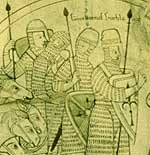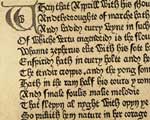| Dialect:
a language variety in which use of grammar and vocabulary
identifies the regional or social background of
the user. (David Crystal). |
 After
the Norman conquest, the English language developed
differently in different parts of the country, as language
always does when there is little communication between
areas. People from one dialect area would have varying
amounts of difficulty understanding people from other
areas. There were six main English dialects and of course
more Scots ones and the whole picture is complex. After
the Norman conquest, the English language developed
differently in different parts of the country, as language
always does when there is little communication between
areas. People from one dialect area would have varying
amounts of difficulty understanding people from other
areas. There were six main English dialects and of course
more Scots ones and the whole picture is complex.
Here
are a few lines in a South West Midland dialect from
the Chronicle of Robert of Gloucester, in the early
C14th, speaking of an issue that still finds its way
into the news today, in one form or another: (The lines
are loosely translated in bold).
 |
Žus
com lo engelond in-to normandies hond
|
 |
| |
Lo,
thus came England into Normandy's hand
|
|
| |
&
že normans ne couže speke žo bote hor owe
speche
|
|
| |
And
the Normans could only speak their own language
|
|
| |
& speke French as hii dude athom, & hor
children dude also teche
|
|
| |
And
speak French as they did at home and had
their children taught (French)
|
|
| |
So
žat heiemen of žis lond, žat of hor blod
come
|
|
| |
So
that nobles of this land, that come of their
blood,
|
|
| |
Holdež
alle žulke speche žat hii of hom nome;
|
|
| |
Retain
all the same language that they of them
received (learned)
|
|
| |
Vor
bote a man conne frenss me telž of him lute,
|
|
| |
Since
unless a man knows French he is thought
little of
|
|
| |
Ac
lowe men holdež to engliss & to hor owe
speche ßute.
|
|
| |
But
humble men hold to English and to their
own language yet.
|
|
|
Whether
or not this opinion is true, the use of language was
enough of an issue to write about. Looking through the
passage, notice
 |
The
ž symbol for 'th' continues. What else reminds you
of the language of Beowulf, 3 centuries earlier? |
 |
There
is no word for 'they', 'them', 'their' etc. - just
'he' and 'him' (ME hii', 'hor', hom) |
 |
There
are still plenty of inflections. Can you list them? |
 |
Notice
the rhymes too. |
 In
other parts of the country other dialects had different
words and usages. A standard version of English only
took firm root with Caxton and the printing press, after
the death of Chaucer. Caxton began printing in Westminster,
London and used the dialect of that area - and of Chaucer. In
other parts of the country other dialects had different
words and usages. A standard version of English only
took firm root with Caxton and the printing press, after
the death of Chaucer. Caxton began printing in Westminster,
London and used the dialect of that area - and of Chaucer.
|